Seismic Geopolitical Impacts on Stock and Commodity Markets
Stock-Markets / GeoPolitics Dec 31, 2008 - 05:41 AM GMTBy: Oxbury_Research
 There's no doubt that geopolitical events have the potential to roil markets. And it's equally true that consideration of the broader sweep of history and its attendant social transformations can offer intelligent investors a chance to profit.
There's no doubt that geopolitical events have the potential to roil markets. And it's equally true that consideration of the broader sweep of history and its attendant social transformations can offer intelligent investors a chance to profit.
So, too, however, is it easy to miscalculate the impact of politics – and even significant military events – on the course of bull and bear markets. Especially in a world driven by 24 hour, live-hype media that would have you believe the sky is falling every time Mahmoud Ahmadinejad hiccups.
A great example of an historical event that directly impacted the longer term course of the markets was the fall of the Berlin Wall. For whatever it accomplished for the local Eastern European population, it was an undeniable boon to capitalism and the free markets that once defined them. And it contributed to a run in stocks that was to last over a decade.
The past few years have also featured events that were far reaching politically and militarily, but that had relatively little effect on the stock market. Even 9-11 can't boast the financial impact that characterized other, equally momentous historical events. See the chart below:
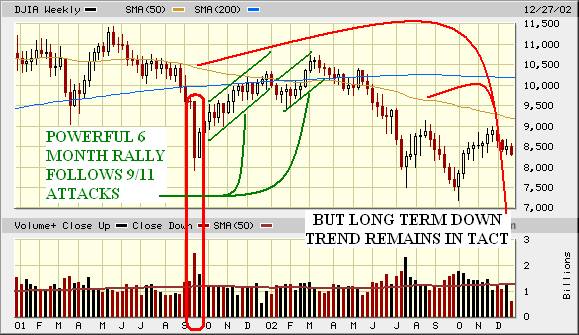
Clearly, the 9-11 attacks had an effect on the market – but one that was overcome a mere four weeks later. In fact, the broad market surged roughly 2300 points in the six months that followed. That's over 25%.
Take another example. From the commencement of the war in Iraq in March 2003 through to the implementation of the “Surge” strategy in 2007, the market, against conventional wisdom, nearly doubled, with the Dow Industrials rising from roughly 7500 to just over 14,000.
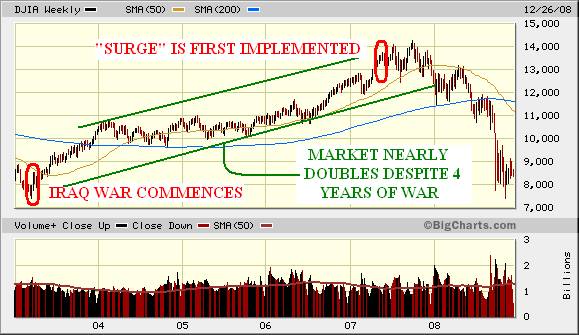
The market was simply ready to rally. And there was nothing anyone could do about it. Galling it must have been for the anti-war types who pleaded that it would cost everyone – investors alike.
It wasn't to be. When the market is ready to rise, it rises, even in the face of the least attractive geopolitical backdrop. And so, too, it happened this year.
2008: A Tale of Three Newsmaking Geopolitical Events
This summer was highlighted by a reasonably serious military confrontation between Russia and her former client state of Georgia . The battle was as much a matter of Russian pride as anything else, but had the clear intention of keeping Georgia weak if she could not be kept within the Russian sphere of influence. The battle was brief, and in the process Georgia lost control of her overland gas pipelines – a prize with which the Russians are still deciding what to do. In the meantime, Georgia is still operating and profiting from them, but the message was clear: stray too far and you lose this tremendous source of needed revenue.
Yet the Russians may yet decide otherwise. Their recent push to transform the Gas Exporting Countries Forum (GECF) into an OPEC-like cartel could potentially place a full three quarters of the world's natural gas reserves and a full half of its production into the hands of just 15 states (led by Russia) – an eventuality that's raising eyebrows in Europe especially, where the majority of its gas is piped in from points east.
Yet with all this, what happened to the price of natural gas? One would have expected the market to begin discounting something of a price rise. One would have expected a trace of worry. What, with war and the talk of cartels? Yet here's the chart:
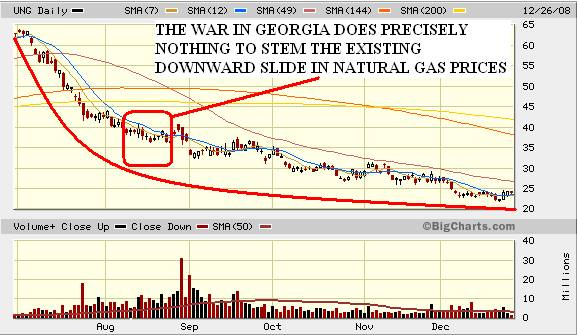
The nine day war had precisely no effect on the NYMEX gas contract. And we know the effect it had on the price of crude oil: another goose egg. Oil has dropped in price this year more than any other traded commodity – a gargantuan 75+% from its 52 week high. The Georgian conflict had no discernible impact on that decline.
So much for the pundits who suggested that the war marked a strategic change in the Caucasus , and that Caspian gas was about to be called in for a reorg. So much for bullish gas calls then or afterward. The market was looking longer term.
Mumbai Terror Sparks Golden Rocket?
The next newsmaking event that many believed would affect markets was the siege in Mumbai, an event that lasted for four days at the end of November, that played itself out in front of a global television audience (including India), and that had no measurable impact on the price of Indian shares. See the chart:
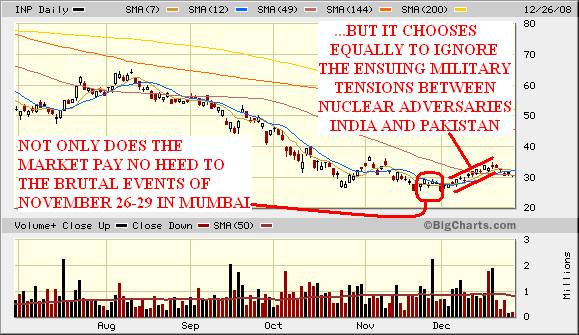
Not even the bellicose shouts between India and rival Pakistan could stem a significant market advance that followed the Mumbai attacks.
But surely this event would affect the price of gold. After all, the Indian market is the world's biggest. Did the images of a capital overrun by a small band of well armed and trained terrorists send the general Indian public running to gold shops? What else could? And what of the gold bugs in the rest of the world? Chart, please:
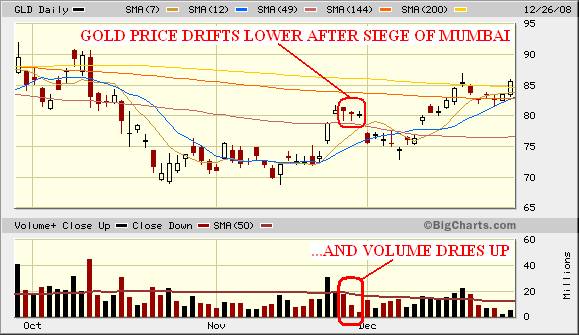
No one cared. Like the Indian market, the gold market also shrugged off a major international news item that gripped the CNN/Al Jazeera-watching public the world over.
And that brings us to our finale. 2008 goes out with a bang as Israel looks to settle scores with long time thorn, Hamas, in the Gaza Strip. What will the markets say to this one?
It's an interesting question because there are times when the market rallies on no news. Then there are other times when nearly any event seems an excuse to send the market soaring (or swooning). For some time now, traders have been suspended, waiting for a sign to come upon them that now is the time to buy (or sell).
It's our belief that the Israeli action will be cause for such a breakout. We believe that breakout will be higher. And we believe it will come on news that the operation is concluded.
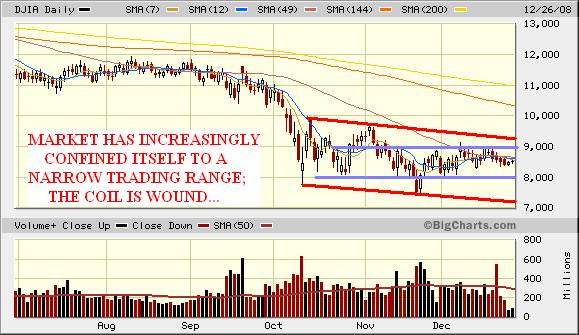
When exactly that will be, we cannot say. But it can't be more than a week or two off. The market is coiled like a spring, and trading has been confined to a tighter and tighter range.
As Bob Dylan said: “Keep your eyes wide, the chance won't come again.”
Matt McAbby
Analyst, Oxbury Research
After graduating from Harvard University in 1989, Matt worked as a Financial Advisor at Wood Gundy Private Client Investments (now CIBC World Markets). After several successful years, he moved over to the analysis side of the business and has written extensively for some of corporate Canada's largest financial institutions.
Oxbury Research originally formed as an underground investment club, Oxbury Publishing is comprised of a wide variety of Wall Street professionals - from equity analysts to futures floor traders – all independent thinkers and all capital market veterans.
© 2008 Copyright Nick Thomas / Oxbury Research - All Rights Reserved
Disclaimer: The above is a matter of opinion provided for general information purposes only and is not intended as investment advice. Information and analysis above are derived from sources and utilising methods believed to be reliable, but we cannot accept responsibility for any losses you may incur as a result of this analysis. Individuals should consult with their personal financial advisors.
Oxbury Research Archive |
© 2005-2022 http://www.MarketOracle.co.uk - The Market Oracle is a FREE Daily Financial Markets Analysis & Forecasting online publication.



